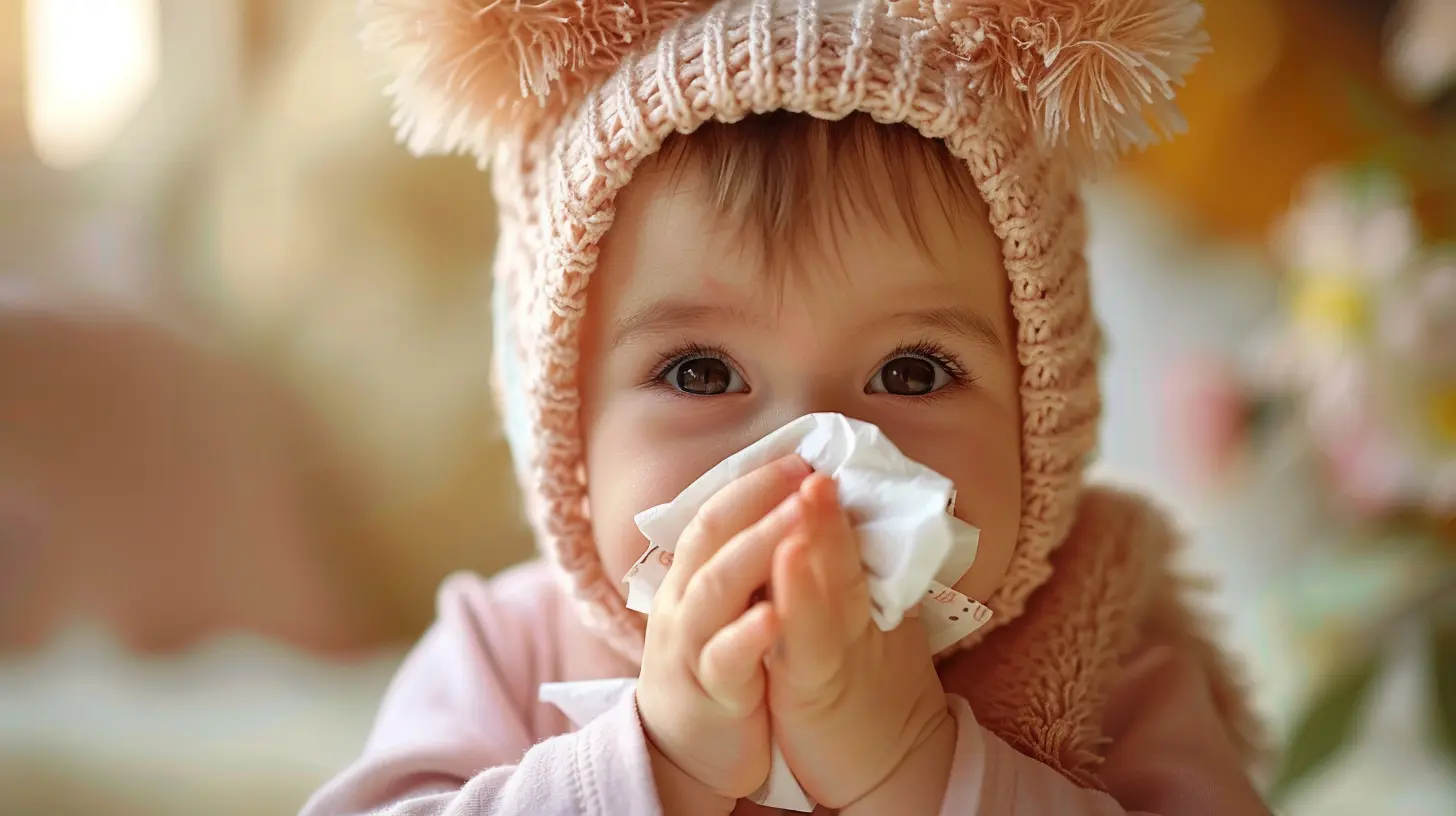How to Safely Introduce Allergens to Babies and Toddlers
11 March 2025
So, you’ve got a little foodie-in-training at home, and the time has come to introduce them to the wonderful (and sometimes intimidating) world of solid foods. One thing that might be lurking in the back of your mind is the daunting topic of allergens. How do you introduce common allergens to your baby or toddler without feeling like you’re defusing a bomb? Well, don’t worry—I've got you covered! This guide will walk you through how to safely introduce allergens, ease your worries, and hopefully keep mealtime as stress-free as possible.

Why Is Introducing Allergens Important?
Let’s start with the big question: why even bother introducing allergens early on? Wouldn't it just be easier to avoid them altogether? Not so fast!Research has shown that introducing allergenic foods during a baby’s early years (around 4-11 months) can actually reduce the risk of allergies developing later. Think of it as helping their immune system learn what’s OK and what’s not. It’s kind of like training a puppy; you want them to get used to new experiences early.
On the flip side, delaying exposure may make your child’s immune system treat those foods as invaders later on. So instead of dodging peanuts or eggs, the better strategy is to approach them carefully, with a game plan.

Timing Is Everything: When to Start?
OK, so when’s the right time to start? Most experts recommend beginning somewhere between 4 to 6 months of age. But here’s the catch—your baby needs to be developmentally ready for solids. Signs that they’re ready include:- Sitting up with minimal support.
- Showing interest in your food (yes, that cute moment when they try to grab your sandwich counts).
- Losing the tongue-thrust reflex (that’s when they stop automatically pushing food out with their tongue).
Before you start, make sure your baby has already been introduced to—and tolerates—other basic solids like pureed fruits, veggies, and cereals. You don’t want to mix allergens into the equation too early because you need to know what’s causing a reaction, should anything pop up.
Pro Tip: Always check with your pediatrician before introducing allergens, especially if your baby is at a higher risk of allergies (e.g., a family history of allergies, eczema, or asthma).

How to Safely Introduce Allergens: Step-by-Step Guide
Now for the nitty-gritty! Here’s how to go about introducing allergens safely without turning every mealtime into a nerve-wracking ordeal.1. Start With One Allergen at a Time
Think of this as a science experiment. You don’t want to test multiple variables at once, right? The same goes for allergens. Introduce one allergenic food at a time and stick with it for 3-5 days before trying another. This gives you time to watch for any reactions.Common Allergens to Introduce
- Peanuts- Eggs
- Milk
- Wheat
- Soy
- Tree nuts (e.g., almonds, cashews)
- Fish
- Shellfish
- Sesame
2. Begin With Tiny Amounts
No need to plop a peanut butter sandwich on their plate just yet! Start small—like a quarter of a teaspoon mixed into their regular food. Mix powdered peanuts into applesauce or stir a bit of scrambled egg into their pureed veggies.If all goes smoothly, you can slowly increase the amount over a few days. Think of it as dipping your toes in the water before jumping in.
3. Timing Matters—Pick a “Safe” Time of Day
Here’s a tip: introduce allergens earlier in the day, like at breakfast or lunch. Why? Because if your baby does have a reaction, you want to be able to monitor them during awake hours (and not freak out in the middle of the night).4. Watch for Signs of an Allergic Reaction
This is the part where you need to channel your inner detective! Keep a close eye on your little one for any signs of an allergic reaction, which might include:- Hives or redness on their skin.
- Swelling, especially around the face, lips, or tongue.
- Vomiting or diarrhea.
- Difficulty breathing (this is a medical emergency—call 911 immediately).
Remember, food reactions can range from mild to severe, so always be prepared.
Pro Tip: Keep some baby-safe antihistamine on hand, but only use it under the guidance of your pediatrician.
5. Reintroduce Regularly
Here’s where some parents get tripped up. After trying a food like peanuts or eggs once, they might feel tempted to check it off the list and not serve it again for months. Nope! To help maintain tolerance, you need to keep reintroducing those foods into your baby’s diet regularly. Think of it as reminding their immune system that peanuts or eggs aren’t a threat.
Special Tips for Specific Allergens
Some allergens need a little extra TLC when you introduce them. Let’s break it down:Peanuts
Peanuts are one of the most common culprits when it comes to severe allergic reactions. Instead of handing over a whole peanut (hey, choking hazard), try peanut butter thinned out with water or formula. Alternatively, there are peanut powder products designed specifically for babies.Eggs
Eggs are another big one. Start with well-cooked egg yolks or scrambled eggs. Avoid raw or undercooked eggs—salmonella is not on the menu!Dairy
If you're introducing cow’s milk, stick with small amounts in cooking or yogurt rather than as a main drink (since babies under 12 months should still rely on breastmilk or formula).Fish and Shellfish
When trying fish, start with mild, low-mercury options like cod or salmon. And with shellfish, always cook it thoroughly to avoid upsetting little tummies.What If Your Baby Has an Allergy?
Even if you follow all the rules, there’s still a chance your baby might react to a food. And guess what? That’s completely OK—it’s not your fault!If you suspect a food allergy, stop feeding that food immediately and contact your pediatrician. They might recommend seeing an allergist for further testing. The good news is that some food allergies (like milk and eggs) are often outgrown in childhood, so there’s hope on the horizon.
Making Mealtime Enjoyable (Even With Allergens)
Introducing allergens doesn't have to be all doom and gloom. Try to make mealtime fun and relaxed—for both you and your baby! Babies pick up on your vibes, so the more confident you feel, the easier it’ll be for them. Turn mealtime into an adventure and celebrate each new food your baby tries (cue the applause when they discover they love peanut butter).And remember, you’re not alone in this journey. Talk to other parents, get advice from your pediatrician, or join an online community. Sharing experiences can be a huge relief—you may even pick up a few game-changing tips along the way!
Final Thoughts
Introducing allergens to babies and toddlers may seem like a big, scary leap, but with the right approach, it doesn't have to be. Take it step by step, watch for cues from your baby, and don’t forget to breathe. Feeding your little one is supposed to be a joyful experience, and with careful planning, you’ll have them exploring a world of flavors in no time.all images in this post were generated using AI tools
Category:
Food AllergiesAuthor:

Madeline Howard
Discussion
rate this article
10 comments
Solstice Estes
Introducing allergens to your little one? Think of it as a culinary adventure — minus the drama! A dash of common sense, a sprinkle of patience, and a whole lot of love will turn this potential minefield into a manageable milestone. Let the taste-testing begin!
April 5, 2025 at 2:47 PM

Madeline Howard
Thank you for your insightful comment! Introducing allergens can indeed be a positive experience with the right approach. Happy taste-testing!
Finnegan Hahn
This article offers valuable insights on introducing allergens to babies and toddlers safely. It emphasizes the importance of timing and method, ensuring parents feel confident in navigating potential allergies while supporting their child's healthy development. A must-read for parents!
March 30, 2025 at 3:20 PM

Madeline Howard
Thank you for your thoughtful feedback! I'm glad you found the article helpful for parents navigating allergen introduction.
Alexander Whitley
Great insights! Early allergen introduction can promote tolerance, but always consult a pediatrician first.
March 29, 2025 at 3:24 PM

Madeline Howard
Thank you! Consulting a pediatrician is crucial for safe allergen introduction.
Elowis McIntyre
Great insights! Early allergen introduction is crucial for preventing allergies. Thanks for sharing!
March 25, 2025 at 3:38 AM

Madeline Howard
Thank you! I'm glad you found the insights helpful. Early allergen introduction can make a big difference!
Cassian Jackson
Introducing allergens can be daunting; your careful approach makes a world of difference for little ones.
March 24, 2025 at 4:02 AM

Madeline Howard
Thank you for your kind words! Ensuring a safe introduction to allergens is so important for our little ones.
Savannah McGivern
Turning tiny taste testers into fearless foodies!
March 19, 2025 at 3:33 AM

Madeline Howard
Thank you! Empowering little ones to explore new flavors is key to their growth and development!
Elidi McKeehan
Introducing allergens to little ones can feel like walking a tightrope—daunting yet essential. With the right timing and a dash of caution, parents can pave the way for resilient future eaters. Remember, it’s all about balance: explore new flavors while keeping safe. Here’s to adventurous and healthy palates!
March 16, 2025 at 4:17 PM

Madeline Howard
Thank you! Striking that balance is key to fostering healthy eating habits while ensuring safety. Your insights beautifully capture the essence of this important journey!
Ardent Rodriguez
Thank you for this informative article! It's so important for parents to understand safe allergen introduction. I appreciate the thoughtful guidance you provided.
March 15, 2025 at 3:36 PM

Madeline Howard
Thank you for your kind words! I'm glad you found the article helpful.
Primrose Gill
Thank you for addressing this important topic. Introducing allergens can be a daunting process for parents, but your insights provide reassurance and guidance. It's essential to approach this journey with patience and care, knowing that every child is different. Supporting each family’s unique path is crucial for safe and healthy development.
March 13, 2025 at 5:28 AM

Madeline Howard
Thank you for your thoughtful comment! I'm glad you found the insights helpful, and I wholeheartedly agree that patience and understanding are key in this journey.
Fiona Roth
Introducing allergens to babies and toddlers can feel daunting, but it's crucial for their development. Start small and consult your pediatrician to create a safe plan. Early exposure can help reduce the risk of allergies later on. Always monitor for reactions. Safety first!
March 11, 2025 at 3:24 PM

Madeline Howard
Thank you for your valuable insights! Starting small and having a plan with a pediatrician is essential for safe allergen introduction. Your emphasis on monitoring reactions is crucial for ensuring safety.
MORE POSTS

The Relationship Between Blood Sugar and Hormones

Sustainable and Healthy Cooking Practices

How to Protect Your Skin from Everyday Environmental Pollutants

The Best Foods to Grill for a Healthy Barbecue

How Consistent Cardio Can Support a Healthy Lifestyle

The Art of Letting Go: Using Mindfulness to Release Stress

The Benefits of Chiropractic Care in Pregnancy